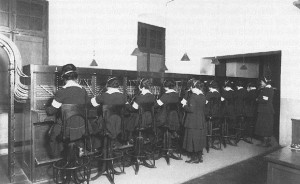
The story of women’s military service during World War II is relatively well known; less familiar is the story of the women who served during World War I, sometimes on or near the front lines. During World War I, over twenty-five thousand women worked for American forces or support organizations in Europe. These women performed integral work and helped chip away at gender stereotypes, paving the way for the more famous WACs and WAVEs of World War II.
Among those serving during World War I was Merle Egan of Helena, a telephone switchboard operator for the Army Signal Corps. A vitally important technology to U.S. military operations, telephones allowed officers to communicate across battlefields, between dispersed units, and with other allied forces. Unfortunately, war had devastated the French telephone system, so in 1917, when the U.S. Army was building up its forces in France, Gen. John Pershing ordered the construction of an American telephone system throughout the country.
The creation of a military telephone system opened up new opportunity for female service since civilian telephone operators were almost exclusively female. As Col. Parker Hitt, chief signal officer of the U.S. First Army, explained: “[A]n Army telephone central would have to have American women operators to be a success. Our experience in Paris with the untrained and undisciplined English-speaking French women operators, and experience elsewhere with the willing but untrained men operators was almost disastrous.” Thus, in November 1917, General Pershing requested that the War Department deploy one hundred French-speaking American women with telephone operating experience. Thousands of women applied and the first of these “Hello Girls” traveled overseas in the spring of 1918. Continue reading Merle Egan Anderson: Montana’s “Hello Girl”